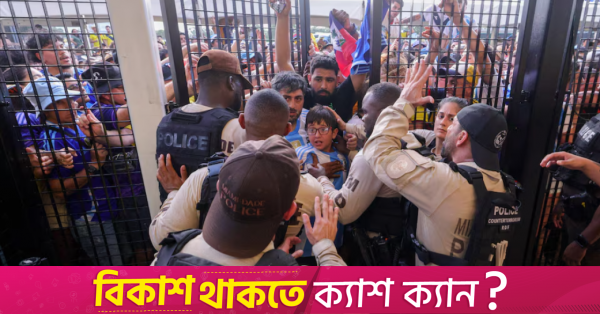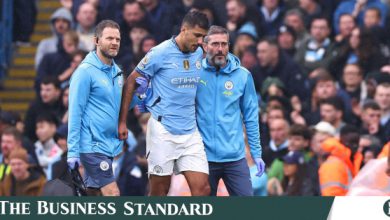United States to review Fifa World Cup plans after Copa America final chaos

Miami-Dade County in Florida will review security protocol for the 2026 World Cup after more than two dozen fans were arrested at Sunday’s Copa America final, capping a tournament rife with discord.
Fans without tickets rushed security and tried to force their way into the Hard Rock Stadium, organisers said, leading to a chaotic scene at the future World Cup venue.
Police initiated a lockdown and hundreds of fans were stuck outside in sweltering heat as South American football’s governing body Conmebol repeatedly delayed the match between Argentina and Colombia.
The match finally kicked off over an hour late.
“Last night our law enforcement teams responded swiftly to handle an extremely challenging, dangerous situation,” James Reyes, the chief of public safety for Miami-Dade County, said in a statement.
“We are working with the event organizers to conduct a comprehensive review of all safety and security protocols, as we continue to prepare for the World Cup in 2026.”
Colombian federation president Ramon Jesurun and his son were among 27 people arrested.
The pair were accused of fighting security personnel after the match ended.
They face three felony counts of battery, according to a criminal complaint reviewed by Reuters. The Colombian federation did not immediately respond to a request for comment.
STADIUM HAS HOSTED BIG EVENTS
More than 800 law enforcement officers were present at the stadium, which is the home of the National Football League’s Miami Dolphins and is used to welcoming massive crowds at the sport’s biggest events, including the Super Bowl four years ago.
A source with knowledge of the security plans told Reuters that security was more lax for the Copa final than for the 2020 NFL championship game, where fans could not get anywhere near stadium entrances without showing a pass at an outside perimeter.
Hard Rock Stadium did not immediately respond to a request for comment on its security plans but said in a prior statement that it had “more than double” the personnel on Sunday than at a typical capacity event. The stadium has a capacity of over 65,000.
“We understand there are disappointed ticket holders who were not able to enter the stadium after the perimeter was closed, and we will work in partnership with Conmebol to address those individual concerns,” it said.
“Ultimately, there is nothing more important than the health and safety of all guests and staff.”
Conmebol pointed blame at the venue in a statement on Monday, saying it was “subject to the decisions made by the Hard Rock Stadium authorities.”
“Conmebol recommended to these authorities the procedures proven in events of this magnitude, which were NOT taken into account,” Conmebol said.
The venue is scheduled to host seven matches, including the bronze medal game, at the 2026 World Cup, which is organized by the sport’s global governing body, Fifa.
Similar incidents have happened in several recent major soccer matches in places including London and Paris.
But it was a bitter disappointment nonetheless for fans at a tournament that had been intended to showcase inter-confederation camaraderie, with the United States hosting South America’s most important national team tournament for the second time.
Instead, the affair slumped across the starting line. Empty seats were in sight at several group matches, with fans complaining about high prices and far-flung stadiums.
The USA team were unable to get out of the group stage and split with their head coach Gregg Berhalter as a result.
Then, security personnel came under fire after Uruguay players clashed with Colombia fans following their Copa America semi-final defeat in Charlotte, North Carolina.
Uruguay coach Marcelo Bielsa later told reporters that his players’ family members were assaulted in the stands and ripped Copa organisers for failing to protect them.
Canada coach Jesse Marsch also criticized tournament organizers ahead of his team’s third-place clash with Uruguay, calling the event unprofessional at every level.
“We’ve had our players be head-butted. We’ve had racial slurs thrown at our players live and through social media,” he said.
He also accused referees of bias against Concacaf players.
“There’s so many things I could say.”





